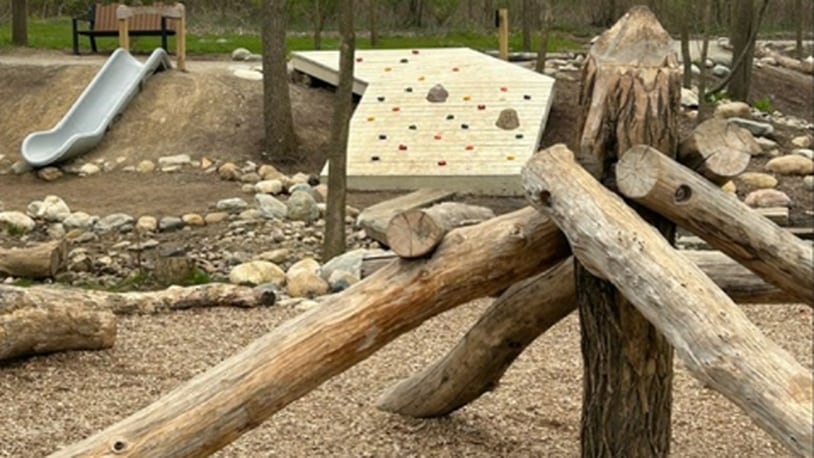“In this era of human existence that we’re heading into, when so many kids now spend a tiny fraction of the time outside that they used to,” Scarff said, “if we don’t connect these kids to nature, how are they going to care about nature” enough to tackle the world’s future environmental challenges?
Nature Play playgrounds are less fabricated than traditional playgrounds, giving kids more opportunity to experiment and problem-solve.
“Traditional play is a structure that is manufactured and pretty rigid without a lot of opportunity for manipulation or creativity,” Scarff says. “What we find in Nature Play is that it’s self-directed, so they’re deciding what they want to do, and there are many more decision opportunities in Nature Play.”
Nature Play playgrounds offer things like sand and water, manipulatable items like sticks to make forts with and slices of logs to climb on. And they’re located in parks where children can experience nature instead of slabs of concrete. The target age range is 2 to 12.
In MetroParks’ most recent public survey, the community said children’s play areas are a top priority, just behind trails and basic amenities such as restrooms.
“The community has endowed MetroParks with the mission of protecting our natural heritage and creating the opportunities for people to connect to nature,” Scarff said. “It is important that we make sure that kids have the opportunity to really engage with nature, and we need to make these opportunities as convenient and meaningful as possible.”
In addition to playgrounds, MetroParks has outreach and advocacy programs for kids. Through the Green Schoolyard Program, teachers learn to use their school outdoor spaces to encourage outdoor learning and nature play. MetroParks provides nature kits that kids can check out and offers nature classes for children through its Conservation Kids program.
Nature Play playgrounds vary in how natural they are vs. how manufactured. As research reveals more about how children learn, many playgrounds are being updated to be more natural, Scarff said.
And safety is paramount.
“There’s a fundamental concept in play that’s particularly important in Nature Play: the difference between risk and hazard,” Scarff said. “When you’re a child, you’re faced with risk. And you have to assess risk and decide how much you want to engage in that risk. That is opposed to hazard, where you cannot see it and evaluate it. It’s something that you can’t see, and yet it’s still a threat to you and so you’re not able to avoid it.
“We avoid hazard 100%,” she said. “But we want to introduce concepts of risk and opportunities of risk. We are not doing right by our children if we don’t give them the opportunity to assess risk, assess their skills, assess what they’re comfortable with and let them act on it in trial and error and learn from it.”
You can visit Nature Play playgrounds at these MetroParks:
- Cox Arboretum MetroPark
- Englewood MetroPark
- Hills and Dales MetroPark
- Possum Creek MetroPark
- Sugarcreek MetroPark
- Wegerzyn’s MetroPark
- Wesleyan MetroPark
MetroParks is working on a Nature Play playground at Eastwood MetroPark. Island MetroPark and Riverscape MetroPark also have outdoor play areas.
MetroParks offers a wide variety of classes and experiences for kids. You can get a complete list and details at www.metroparks.org. Here are some upcoming highlights for younger children, pre-teens and families. Some events may require registration.
- April 20: Spring Wildflower Exploration, Taylorsville MetroPark
- April 20: Spring Frog Survey, Germantown MetroPark
- April 24: Tike Hike, Englewood MetroPark
- May 4: Mother and Son Fishing Day, Possum Creek MetroPark
- May 4: Planting for Pollinators, Cox Arboretum
- May 15: Tike Hike, Carriage Hill MetroPark
- May 18: Nest Watch Monitoring, Germantown MetroPark
- May 24: Tike Hike, Wesleyan MetroPark
- June 29: Mud Day, Wegerzyn’s MetroPark
Jana Collier is a member of the Five Rivers MetroParks Foundation Board. To learn about the foundation and how you can help, go to metroparks.org/about/foundations.
About the Author
